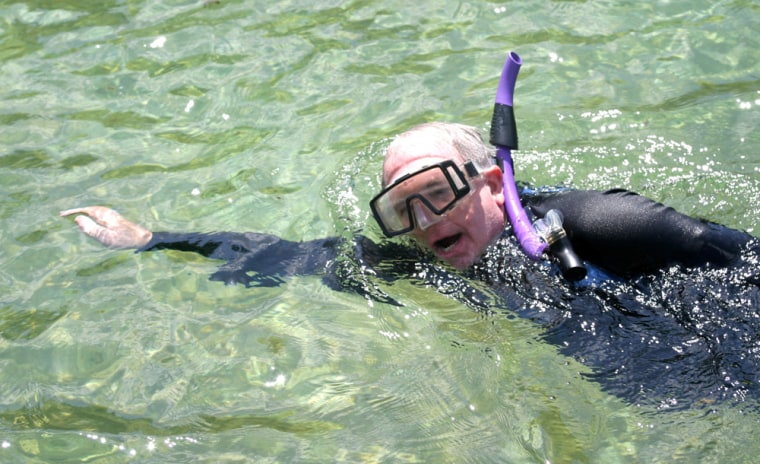As a scuba diver, Paul Ellis has explored coral reefs the world over. Brimming with color and marine life, they are his passion.
Saving them is his mission.
At 61, Ellis is training for the swim of a lifetime, a challenge he calls “my personal Mount Everest.” On Aug. 5, he’ll splash through a 35-mile endurance quest from Cozumel to Cancun across Mexico’s Yucatan Channel. The goal is to raise awareness of the peril facing the world’s coral reefs.
A 2002 report by the Institute of the Environment’s Reef Check program at the University of California, Los Angeles found that virtually all of the world’s reefs show signs of declining health, with much of the damage done over the last 20 years.
Ellis’ swim is 14 miles longer than crossing the English Channel, but distance is only one challenge.
Darkness, currents, tiger sharks and jellyfish promise to make it one of the toughest tests this former Marine has faced. He’ll jump in about 1 a.m. and isn’t expected to emerge for 12 hours.
“I’m no superswimmer,” Ellis said after a recent training session at Austin’s Barton Springs pool. “I’d better be ready. It’s a long black way from Cozumel to Cancun.”
No typical extreme athlete
Ellis doesn’t look like an extreme athlete, and he’s no daredevil. He’s more of an Average Joe, standing about 5-foot-10, 195 pounds with graying hair. He is founder and chairman of Austin Business College and an education activist, helping spearhead a literacy campaign in the city. He dodged enemy fire as a helicopter pilot in Vietnam and once rode cross-country on a motorcycle.
The environment is his most recent crusade.
“That’s kind of a new twist,” son Tres Ellis said. “As a diving family, we’ve always been environmentally conscious but that wasn’t a driving thing for him.”
Ellis’ calm demeanor hides a confident, free-spirit attitude that has been clouded by what he’s seen in 30 years of scuba diving.
“I have seen through my own mask the astonishing deterioration of the coral reefs of the world,” Ellis said.
Most of the world’s coral reefs are in decline because of overfishing and pollution. Ellis ultimately hopes his swim will get 1 million people to donate time and money to marine conservation.
He has spent more than $30,000 of his own money on the effort.
Why worry about reefs?
Coral reefs rank second only to rain forests for biodiversity and have proved a valuable source for medical researchers. Chemical compounds found on reefs have been used to fight cancer and HIV, the virus that causes AIDS.
“That’s why we should take care of reefs,” said Reef Check’s Gregor Hodgson, an ecologist and professor at UCLA. “Everything is linked in these ecosystems. If we pull that particular link, it’s likely to destabilize the entire earth function.”
Other swimmers have used the sport to raise awareness for a cause.
In 1998, Frenchman Benoit Lecomte swam the Atlantic Ocean in 71 days from Hyannis, Mass., to Quiberon, France, to raise money for cancer research.
Last summer, Christopher Swain, of Portland, Ore., became the first person to swim the full 1,243 miles of the Pacific Northwest’s Columbia River to draw attention to pollutants in one of the continent’s most scenic rivers. In 1996, he swam 210 miles of the Connecticut River to draw attention to human rights issues.
Ellis chose the Yucatan Channel because he loves the waters and wanted to highlight Mexico’s efforts to protect the Meso-American barrier reef, one of the largest in the world.
First attempt failed
He first got the idea four years ago. He was 57, an age when other men are counting down the years to retirement.
“I want to be a good example to my children and grandchildren,” he said. “I want them to know it’s never too late to make an impact.”
His first attempt at swimming the Yucatan Channel in July 2002 was thwarted by bad weather and changing currents that forced him out of the water after about 11 hours.
Undaunted, he trains by swimming six days a week, splashing back and forth in laps of nearly a 10th of a mile at Barton Springs. His swim stroke coach is former Mexican Olympic swimmer Josh Ilika and he’s received expert advice about his nutrition.
The swim will take Ellis about 15 miles off shore in water up to 4,000 feet deep. Tres and two other sons — Colin and Paul Matthew — will be among an expedition crew of about 12 people on three boats watching for sharks and jellyfish.
Because he’s starting in the middle of the night, Ellis will spend several hours in the dark with only a light from one of the boats illuminating the water directly in front of him.
Cruise liners present another potential problem because they navigate the same waters. Wake churned up from a huge ship could make the swim choppy.
Ellis, who once encountered a bull shark on a swim off the North Carolina coast, said he’s ready to face the risks.
“We’re trying to save the world here,” he said.
More about the Ellis' campaign is online at www.swim4thereef.com.
